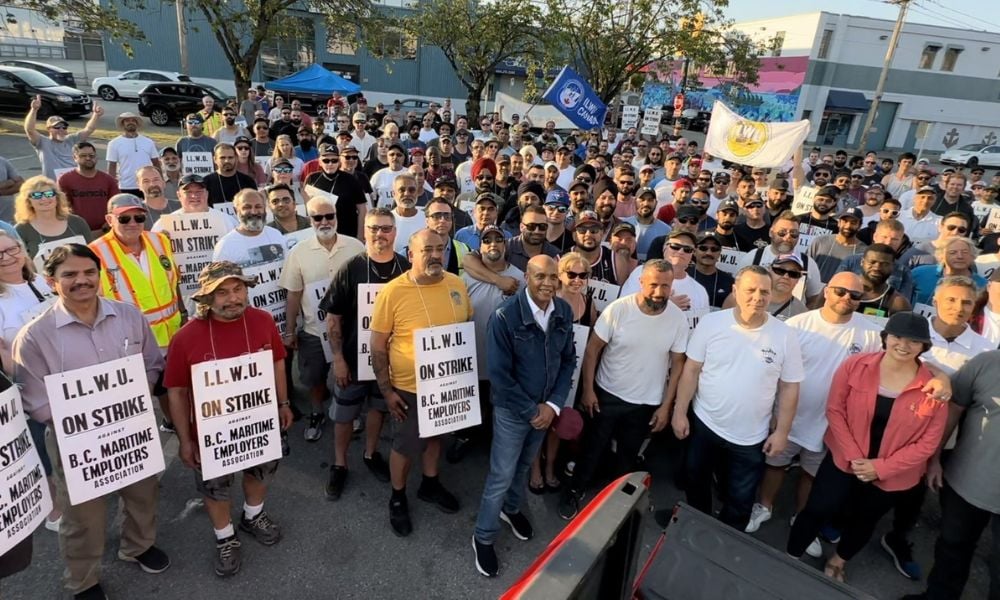How safety leaders across Canada could be impacted by labour dispute

Concerns over worker safety and fatigue are among the issues at the centre of a labour dispute disrupting many sectors of the Canadian economy. About 7,400 port workers in British Columbia walked off the job on Canada Day. The strike directly affects 49 of the province’s waterfront employers at more than 30 ports in B.C.
The union representing the workers, the International Longshore and Warehouse Union (ILWU), is accusing the BC Maritime Employers Association (BCMEA) of a “dirty tricks media campaign,” it says is meant to smear the reputation of workers.
Safety issues at play
“The reality is, our people do hard work under difficult, often dangerous conditions, and they kept Canada’s economy moving through the worst of the pandemic,” says Rob Ashton, ILWU president. “That’s a long ways from the picture the employer wants to paint. It can be a good living, but it takes years of sacrifice to get there, and it’s still hard work.”
There are several hazards to mitigate when working around cargo ships.
An ILWU press release states that rates of injury are high among dock workers, “with several deaths recorded in recent years.” One worker recently suffered a medical event while operating a crane, and the elevator to get him down wasn’t working at the time of the incident. The worked died.
The union also says in order to achieve pay rates at the higher end of the scale means working long night shifts, “six or seven days a week.” Impairment by fatigue has been described as being similar to that of being impaired by alcohol or drugs.
A couple of days into the strike, the BCMEA claimed the union is trying to "aggressively expand'' its control of maintenance duties far beyond an agreement that the association argued has been "legally well established for decades.''
Claims of smear campaign
The ILWU is accusing the BCMEA of engaging in a deliberate smear campaign targeting workers, and casting them as greedy by exaggerating the livelihood of dock workers “using anonymous sources to selectively leak misleading information to reporters,” says Ashton.
If true, it could be described as a psychological attack on workers. “We’re telling the BCMEA to call off their attack campaign, and come back to mediation. We’re willing to look past the smears and insults if it means we can return to the place where respectful negotiations and an honest deal can happen,” says Ashton.
Widespread economic impact
The longer the strike continues, the more devastating the impact on the Canadian economy, and the ILWU believes the BCMEA is waiting for the federal government to impose back-to-work legislation.
The BCMEA website says member terminals saw 16 percent of Canada’s total traded goods in 2020, worth $2.7 billion in national GDP. The Port of Vancouver alone is home to 29 major terminals and handles the most diversified range of cargo in North America. It’s the same size as the next five largest Canadian ports combined and is considered a trading gateway to more than 170 economies. It handles about 142 million tonnes of cargo annually.
The BCMEA issued a statement this week suggesting the impact of the strike on the economy has triggered layoffs in other industries and has disrupted $4.6 billion worth of cargo.
Trevor Heaver, professor emeritus at UBC's Sauder School of Business, tells CBC News the backlog and delays will force industry to play catch-up once workers do return to the ports.
"Think of the problems that are going to be faced by the railroads…they've got backlogs of containers to move with people in a rush, they've got bulk commodities that need to be moved, so there's going to be significant congestion-type costs subsequent to this and the longer it goes on, the worse that's going to be."
Meanwhile, the Canadian Manufacturers and Exporters trade group says small and medium-sized businesses will be hurt most.
With the strike having a massive ripple effect, safety leaders will want to be cognizant of how and where their organizations procure the necessary PPE to keep their workers safe on the job. If it comes from China or other places in Asia, it could potentially be impacted by the strike.





